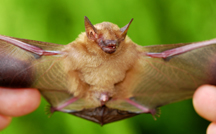
| RELATED INFO |
| * Species Naming and Conservation Initiative |
| * Center for the Environment |
| * Discovery Park |
| * Purdue Department of Forestry and Natural Resources |

December 8, 2008
Purdue has a holiday gift idea: Name a new species of bats
WEST LAFAYETTE, Ind. - |
Purdue University is auctioning the naming rights to several new species discovered by researcher John Bickham, a Purdue professor of forestry and natural resources who specializes in genetic studies of fish and wildlife, including biodiversity and biosystematics.
First up: a rare family member of the little yellow bat.
"This provides a terrific opportunity to recognize someone who loves science and wants to be more involved in the discovery of a species in the vast world around us," said Bickham, who is donating the species naming rights to Purdue. "They would be able to join me and a Purdue team on a future scientific research expedition. Plus, the species name is forever, so you'd be immortalized in the international scientific community."
 |
Bickham, director of Discovery Park's Center for the Environment, has discovered or co-discovered seven species, including two Amazonian turtles and bats from areas in Mexico, Central America, South America and Africa.
Proceeds from the naming project will be used to fund environmental research at Purdue and in the country of the species' origin. In addition, the funds will be used to host symposia and to sponsor undergraduate and graduate student research programs.
The first species to be named, in conjunction with the Center for Environment's Species Naming and Conservation Initiative, is a relative of the little yellow bat, known scientifically as Rhogeessa tumida. The newly discovered bat lives in the Central American countries of Mexico, Panama, Guatemala and Nicaragua.
"These are the smallest bats in the New World," Bickham said. "They weigh just 3 grams and are very colorful, fittingly in the Purdue-like gold and black. These bats also are especially important, because they are sensitive indicators of environmental quality and a model of how species evolved. For someone wanting to have a species in their name, this is an interesting and unique bat."
 |
Alan H. Rebar, director of Purdue's Discovery Park, said other universities and conservation groups have been successful in collaborating with donors who have a shared stake in conservation to ensure the continuation of many of these rare species.
"The process to publish and validate new species is extremely rigorous, time-consuming and can cost hundreds of thousands of dollars," Rebar said.
Those interested in Purdue's species naming initiative can go to a special Web site at https://www.purdue.edu/dp/environment/species/. Visitors also can find more information about these bats and related research by contacting the Center for the Environment at (765) 494-5146.
"We are trying to document and identify biodiversity before it's lost forever," Bickham said. "We face a grand challenge with the loss of biodiversity and the extinction of organisms. We are seeing more and more species disappear due to the destruction of habitats worldwide. It's an extinction event that could rival the one in which the dinosaurs disappeared 65 million years ago."
When a new species is discovered, a formal description is published in scientific literature that spells out what makes it distinct and a name is given that conforms to the specific guidelines outlined by the zoological community.
"In the case of the rare bat offered through this Purdue program, the species name would look like: Rhogeessa (your name here)," Bickham said. "And fitting with the scientific protocols and the Latin descriptions for the genus and species, we would add an 'i' to the person's name."
Bats are of special interest for several reasons to Bickham, who joined the Purdue faculty in 2006 after spending 30 years at Texas A&M University.
"Bats account for about one-fourth of all mammal species," he said. "They also perform an extremely important function as seed dispersers, and in many places they help control insect pests. They are critical in many climates in helping control the insect population. And many plant species depend almost entirely on bats for pollination."
The idea of auctioning new species naming rights is gaining popularity internationally:
* A September 2007 auction of rights to name 10 newly discovered species of fish generated $2 million for conservation efforts in eastern Indonesia. The Blue Auction, sponsored by Conservation International and the Monaco-Asia Society, raised $500,000 alone for a Hemiscyllium shark from Cendrawasih Bay and $50,000 for the Pseudanthias fairy basslet.
* An online auction for naming rights to a new owl butterfly species discovered by the University of Florida brought a winning bid of $40,800 in November 2007, with proceeds benefiting continued research on Mexican butterflies.
* The Wildlife Conservation Society raised $650,000 in a one-week Internet auction to name a newly identified Bolivian monkey in 2005.
Bickham has published more than 190 papers in peer-reviewed scientific journals. His research interests focus on genetic mutations and how they are produced and transmitted in individuals, populations, species and the evolutionary processes that affect genetic change. His international studies include projects in Azerbaijan, Russia, Mexico and Guatemala.
Writer: Phillip Fiorini, (765) 496-3133, pfiorini@purdue.edu
Sources: John Bickham, (765) 494-5146, bickham@purdue.edu
Alan Rebar, (765) 496-6625, rebar@purdue.edu
Purdue News Service: (765) 494-2096; purduenews@purdue.edu
Note to Journalists: Rhogeessa tumida is pronounced Ro-gee-sa too-mi-da.
PHOTO CAPTION:
This newly discovered bat is a relative to the little yellow bat and is native to Mexico, Panama, Guatemala and Nicaragua. John Bickham, a Purdue professor of forestry and natural resources, and his collaborators conducted genetic studies and discovered that several populations of this bat represent unique, previously unknown species. Bickham is now offering the rights to name the species to support continued research at Purdue and Discovery Park's Center for the Environment. (Purdue photo courtesy of John Bickham)
A publication-quality photo of the little yellow bat is available at https://www.purdue.edu/uns/UNS/images/+2007/bat-littleyellow.jpg
To the News Service home page
